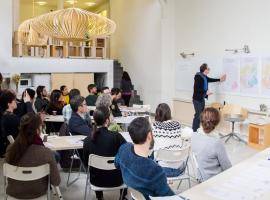To make sense of what happened after the Mares de Madrid initiative's official closure, we have to look first at the local policy frameworks within which it was rooted. The "strategy for the development of the social and solidarity economy (SSE)" approved by the previous administration does not seem to be a priority of the new administration. The planned "Observatory of the Social and Solidarity Economy" was not put in place while the offices for the support of the social economy - the "Oficinas de la Economia social" - have been closed. However, financial support for SSE enterprises and several collaborations between long-established SSE associations and the city are still in place. Yet, Mares de Madrid's managing entities - cooperatives such as Tengente or Dynamia - no longer have collaboration standing with the city and therefore are not involved in Mares de Madrid’s follow-up. Differently, the "Plan Strategico de Reequilibrio Territorial" - the spatial equalisation scheme aimed at supporting more impoverished neighbourhoods - has been kept in place with additional funding and more initiatives in the south and east of the city, included the area of Villaverde (where the Mar of Food and its Gastrolab are). This strengthening has been made possible by additional investments related to the financial compensations implied by Castellana Norte's implementation, an extensive urban transformation project.
Second, we have to look at the spaces. At the closure of the initiative a year ago, out of the four planned spaces two were open and active: the Mar of Energy, located in the neighbourhood of Centro, and the Mar of Food, located in the neighbourhood of Villaverde. The city is currently completing what was supposed to be the Mar of Recycling, in Vicalvaro. While the Mar of Mobility - that had to be located in a reclaimed historic building in Vallecas - will not be completed as archaeological findings made the achievement impossible. After the end of the initiative, the two available spaces have had to face a new situation in which the coordinators and staff put in place by Mares were no more in place while the temporary spaces where the Mar of Recycling and the one of Mobility were hosted were shut-off. In this interim phase, the two former stayed open to the economic projects previously using them - with the right to stay up to one year since - but of course with no support of the specific services previously insured by Mares consortium members. The Mar of Food stayed open, but the Gastrolab closed. The Mar of Energy kept hosting roughly 15 of the economic initiatives previously supported - although with a more limited opening schedule - and some projects supported by Madrid International, an internationalisation-focused start-up incubator. Of course, this interim phase was short-lived as Madrid was hit in March by the pandemic that also entailed the closure of all city buildings open to the public. The Grastrolab proved precious in such a moment as two NGOs used it to prepare roughly 1000 meals every day for people in need at the crisis’s peak.
Of course, the end of the initiative did not impact only the spaces - that suddenly lacked a formalised and fully engaged management - but also the single economic initiatives and the overall ecosystems formed during the years of its implementation. By looking at the Mar of Mobility case, one can sense the resilience of what was created with Mares and the challenges that this difficult transition is posing. One of Mares’ managing entities - the Vivero de Iniciativas Ciudadanas, to which belonged to the Mar of Mobility coordinator - has managed to keep ties with some projects. This also happened by making available the equipment acquired during the project and occasionally offering some informal support to both already known and new initiatives. Of course, some of the more mature initiatives - such as La Pajara and Transcop (see previous issues of this Journal) - were already completely self-reliant once the project closed, but others less mature were still in need of support. On the positive end, much of the knowledge on mobility innovation generated during the initiative is being used to create and support other projects, as in the Indimo Horizon 2020 project, which focuses on digitally interconnected transport systems. Also, some while some of the sector CAPs (the learning communities) are still active. However, the city will set up a Sustainable Mobility Hub focusing on electric mobility and logistics and freight transport innovation. Companies, national associations and the Polytechnic University of Madrid will participate to the project that will start operating at the end of 2021. Together with CIEC - the former Mar of Energy - the new hup is supposed to absorb the MARES project's mobility, energy, and recycling ecosystems.















